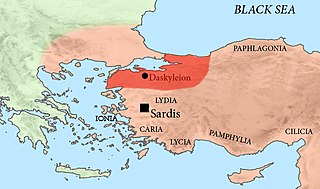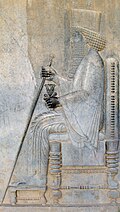Related Research Articles
Mithridates of Cius a Persian noble, succeeded his kinsman or father Ariobarzanes II in 337 BCE as ruler of the Greek town of Cius in Mysia. Diodorus assigns him a rule of thirty-five years, but it appears that his rule of Cius was interrupted during that period. What circumstances led to his expulsion or subjection are unknown; nothing is heard of him until his death in 302 BCE. However, it appears that he had submitted to the Macedonian Antigonus, who, to prevent him from joining the league of Cassander and his confederates, arranged for his assassination in Cius.
Mithridates, son of Ariobarzanes prince of Cius, is mentioned by Xenophon as having betrayed his father, and the same circumstance is alluded to by Aristotle.

Ariobarzanes, sometimes known as Ariobarzanes I of Cius, was a Persian Satrap of Phrygia and military commander, leader of an independence revolt, and the first known of the line of rulers of the Greek town of Cius from which were eventually to stem the kings of Pontus in the 3rd century BCE. Ariobarzanes was apparently a cadet member of the Achaemenid dynasty, possibly son of Pharnabazus II, and part of the Pharnacid dynasty which had settled to hold Dascylium of Hellespont in the 470s BCE. Cius is located near Dascylium, and Cius seemingly was a share of family holdings for the branch of Ariobarzanes.
Myrmidon was an Athenian who commanded a force of ten thousand mercenaries, which formed part of the reinforcements sent by Ptolemy, under the overall command of his brother Menelaus, to effect the reduction of Cyprus, in 315 BC. He was afterwards dispatched to the assistance of Asander in Caria, against the generals of Antigonus Monophthalmus.
Eupolemus was one of the generals of Cassander; he was sent by him in 314 BC to invade Caria, but was surprised and taken prisoner by Ptolemy, a general who commanded that province for Antigonus. He must have been liberated again directly, as the next year we find him commanding the forces left by Cassander in Greece, when he moved northward against Antigonus.

Asander or Asandros was the son of Philotas and brother of Parmenion and Agathon. He was a Macedonian general under Alexander the Great, and satrap of Lydia from 334 BC as well as satrap of Caria after Alexander's death. During Alexander's reign Asander' s position suffered for a period following Parmenion's execution, he was sent to Media to gather reinforcements during this time, and a year later was sent to Bactra.
Agathon was the son of the Macedonian Philotas and the brother of Parmenion and Asander. He was given as a hostage to Antigonus in 313 BC, by his brother Asander, who was satrap of Caria, but was taken back again by Asander in a few days. Agathon had a son, named Asander, who is mentioned in a Greek inscription.
Philoxenus was a Macedonian officer appointed to superintend the collection of the tribute in the provinces north of the Taurus Mountains after Alexander the Great's return from Egypt in 331 BC. However, he did not immediately assume this command because he was sent forward by Alexander from the field of Gaugamela to take possession of Susa and the treasures there deposited, which he effected without opposition. After this, he seems to have remained quietly in the discharge of his functions in Asia Minor, until the commencement of the year 323, when he brought troops from Caria to Babylon, where he arrived just before the last illness of Alexander. In the distribution of the provinces which followed the death of that monarch, there is no mention of Philoxenus, but in 321 he was appointed by Perdiccas to succeed Philotas in the government of Cilicia. By what means he afterwards conciliated the favour of Antipater is unknown, but in the partition at Triparadisus after the fall of Perdiccas the same year, he was still allowed to retain his satrapy of Cilicia. No information exists beyond then.
Autocles of Euonymeia, son of Strombichides, was one of the Athenian envoys empowered to negotiate peace with Sparta in 371 BC. Xenophon reports a somewhat injudicious speech of his, which was delivered on this occasion before the congress at Sparta, and which by no means confirms the character, ascribed to him in the same passage, of a skilful orator. It was perhaps this same Autocles who, in 362, was appointed to the command in Thrace, and was brought to trial for having caused, by his inactivity there, the triumph of Cotys over the rebel Miltocythes. Aristotle refers to a passage in a speech of Autocles against Mixidemides, as illustrating one of his rhetorical topoi.
Themison was a tyrant of Eretria who in 366 BC assisted the exiles of Oropus in recovering possession of their native city. They succeeded in occupying it by surprise, but the Athenians having marched against them with their whole force, Themison was unable to cope with their power, and called in the Thebans to his assistance, who received possession of the city as a deposit, but afterwards refused to give it up.

Abrocomas was satrap of Syria for the Achaemenid king Artaxerxes II Mnemon. He may also have been satrap of Paphlagonia, with its capital at Sinope, according to the reading of some of the coinage of Sinope: the Aramaic reading "ˈbrkmw" has been identified as the name rendered in Greek as "Abrocomas", but this is not universally accepted.
Car or Kar is a name in Greek mythology that refers to two characters who may or may not be one and the same.
Metrodorus of Stratonikeia (Caria) was at first a disciple of Epicureanism, but afterwards attached himself to Carneades. His defection from the Epicurean school is almost unique. It is explained by Cicero as being due to his theory that the scepticism of Carneades was merely a means of attacking the Stoics on their own ground. Metrodorus held that Carneades was in reality a loyal follower of Plato. Cicero speaks of him as an orator of great fire and volubility. He flourished about 110 BC.
Agasias was a Stymphalian of Arcadia who was frequently mentioned by Xenophon as a brave and active officer in the Army of the Ten Thousand. He was an acquaintance of both Hiero I of Syracuse and Xenophon. In his youth, he achieved an Olympic victory, and hired Pindar to compose a song of celebration. He was wounded while fighting against Asidates.
Agathon is a given name.
Timasitheus or Timesitheus was a citizen of Trapezus, and a proxenus of the Mossynoeci, between whom and the Cyrean Greeks he acted as interpreter, when the latter wished to make a treaty with the barbarians, and to obtain a passage through their country.
Leucophrys or Leukophrys was a town of the ancient Ionia, and earlier of Caria in the plain of the Maeander river. It was on the borders of a lake, whose water was hot and in constant commotion. The town possessed a very revered sanctuary of Artemis; hence surnamed Artemis Leucophryene or Leucophryne. The poet Nicander spoke of Leucophrys as a place distinguished for its fine roses. Xenophon records that, in 398 BCE, Leucophrys was the site to which the Greek troops, under the command of the Spartan Dercylidas withdrew after the meeting between them and the troops of Achaemenid Empire led by the satraps Tissaphernes and Pharnabazus II. The next day in the place they had agreed to, they negotiated peace. The Persians would allow the Greek cities to be autonomous and the Greek army and the Laconian harmosts would return across the Aegean Sea.
Aribaeus, the king of the Cappadocians, was slain by the Hyrcanians, in the time of Cyrus the Great, according to Xenophon's Cyropaedia.
Aridolis was a tyrant of Alabanda in Caria, who accompanied the Achaemenid king Xerxes I in his expedition against Greece, and was taken by the Greeks off Artemisium in 480 BCE, and sent to the isthmus of Corinth in chains. His successor may have been Amyntas II.
"They took in one of these ships Aridolis, the despot of Alabanda in Caria, and in another the Paphian captain Penthylus son of Demonous; of twelve ships that he had brought from Paphos he had lost eleven in the storm off the Sepiad headland, and was in the one that remained when he was taken as he bore down on Artemisium. Having questioned these men and learnt what they desired to know of Xerxes' armament, the Greeks sent them away to the isthmus of Corinth in bonds."
Cedreae or Kedreai, also known as Cedreiae or Kedreiai (Κεδρειαί), was a city of ancient Caria, mentioned by Stephanus of Byzantium Lysander took the place, it being in alliance with the Athenians. The inhabitants were mixobarbaroi (μιχοβάρβαροι), a mixture of Greeks and barbarians. It was a member of the Delian League since it appears in tribute records of Athens between the years 454/3 and 415/4 BCE.
References
- ↑ Xenophon, Cyropaedeia vii. 4. § 1, &c., viii. 6. § 7
- ↑ Smith, William (1867), "Adusius", in Smith, William (ed.), Dictionary of Greek and Roman Biography and Mythology , vol. 1, Boston, p. 22
![]() This article incorporates text from a publication now in the public domain : Smith, William, ed. (1870). "Adusius". Dictionary of Greek and Roman Biography and Mythology .
This article incorporates text from a publication now in the public domain : Smith, William, ed. (1870). "Adusius". Dictionary of Greek and Roman Biography and Mythology .
